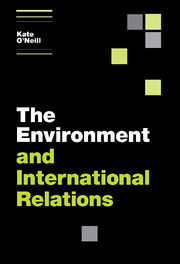Book contents
- Frontmatter
- Contents
- Preface
- Acknowledgements
- List of commonly used abbreviations
- 1 Introduction: The environment and international relations
- 2 International environmental problems
- 3 Actors in international environmental politics
- 4 State-led global environmental governance: International cooperation and regime formation
- 5 The impacts and effectiveness of environmental treaty regimes
- 6 Global economic governance and the environment
- 7 Non-state global environmental governance
- 8 Conclusions: The environment and international relations in the twenty-first century
- References
- Index
- References
3 - Actors in international environmental politics
Published online by Cambridge University Press: 05 June 2012
- Frontmatter
- Contents
- Preface
- Acknowledgements
- List of commonly used abbreviations
- 1 Introduction: The environment and international relations
- 2 International environmental problems
- 3 Actors in international environmental politics
- 4 State-led global environmental governance: International cooperation and regime formation
- 5 The impacts and effectiveness of environmental treaty regimes
- 6 Global economic governance and the environment
- 7 Non-state global environmental governance
- 8 Conclusions: The environment and international relations in the twenty-first century
- References
- Index
- References
Summary
This chapter introduces the large and complex cast of characters active in international environmental politics and governance. We examine five main types of actor: nation states, international organizations, the global environmental movement, the corporate sector, and expert groups. The latter four groups are often referred to collectively as “non-state actors,” but they differ significantly from each other. We look at who each of these groups is, how they engage in global environmental governance, and some of the critical questions around their participation in and influence on the politics of the global environment. We also briefly examine two categories of actor largely absent from the study of global environmental governance: the broader public, and specific individuals.
One finding that has emerged from work in international environmental politics is that the roles these groups of actors play in global environmental governance are not fixed, but change over time and across issue areas, partly as a result of changing governance structures and opportunities to participate but also because of entrepreneurialism on the part of the actors themselves. In the case of international environmental cooperation, states take on the lead part, with non-state actors in supporting roles. For non-state modes of governance, their roles are reversed. Across the modes and sites of global environmental governance we examine in this book, there is also strong variation in how groups of actors interact with each other.
- Type
- Chapter
- Information
- The Environment and International Relations , pp. 48 - 70Publisher: Cambridge University PressPrint publication year: 2009



